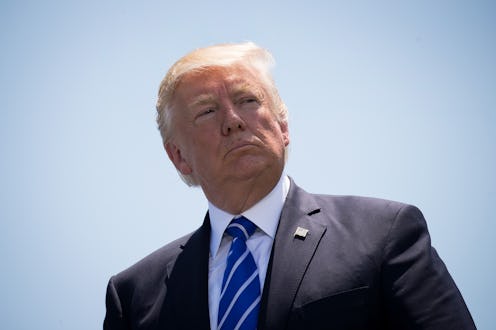News
Trump’s National Security Strategy Is "America Is Going To Win" & Not Much Else

Foreign policy is one of the most lasting and most prominent pieces of any president's legacy. On Monday, President Trump gave a speech outlining his national security plan that focused on his goals for the presidency. The strategy is being described as a plan to "advance America's interests," and while he's already given several speeches on his "America First" philosophy, this latest address focused on national security, but for many, it felt light on specifics.
"We are rebuilding our nation, our confidence and our standing in the world. We have moved swiftly to confront our challenges, and we have confronted them head-on," Trump said.
White House aides said in advance of the speech that Trump would shift the emphasis in America's national security circles from economic security and alliances with other countries to national sovereignty. The Trump administration's foreign policy and national security doctrine is made up of four "pillars" or four vital national interests: protecting the homeland and the American way of life, enhancing American prosperity, providing an example of using strength to create peace, and spreading American influence in a world that is becoming increasingly globalized and competitive.
On Twitter, people pointed out that there wasn't much to the speech. "Overheard at the Pentagon, RE: Trump's speech and the lack of an actual explanation of a strategy: 'Sometimes the best strategy is no strategy,'" a Twitter account called "OH at the Pentagon" tweeted.
"We will stand up for ourselves and we will stand up for our country like we have never stood up before." Trump said. "We know that American success is not a foregone conclusion. It must be earned and it must be won. Our rivals are tough, they're tenacious and committed to the long-term, but so are we."
Although the slogan "America First" was a huge part of Trump's campaign and even made it into his inauguration speech, he and his administration have struggled to lay out in a concrete way what those words translate to in terms of actual policy decisions. National security advisor H.R. McMaster coined a second slogan, “Peace through strength," that describes one of the pillars.
Some people pointed out that the speech felt less like a national security strategy outline and more like a typical 2016 rally speech. "Anyone surprised that Trump is giving a campaign speech rather than a summation of National Security strategy should probably start paying attention," Chris Jackson wrote.
While Trump and his supporters claim that abandoning international agreements, like the Paris climate accords, will advance American interests, critics claim that Trump's lack of focus on diplomacy and his erratic behavior on Twitter and elsewhere actually damage America's position in the world. Of particular concern to critics is the administration's treatment of the State Department, where hundreds of top career diplomats have departed and hundreds more important, high level positions remain unfilled.
According to a global Pew poll conducted in July, America's unfavorable ratings have increased dramatically in the time since Trump took office. This would seem to contradict the fourth pillar of the America First doctrine, as one might think high favorability ratings would help achieve the goal of spreading American influence. The White House's website states the Trump administration intends to "[lead] a coalition of strong and independent nations to promote security, prosperity, and peace both within America’s borders and beyond" and "[reassert] American sovereignty" — and while the speech has re-upped those goals, it was short on specifics.
"With the strategy I'm announcing today," he said, "we're declaring that America is in the game, and America is going to win."